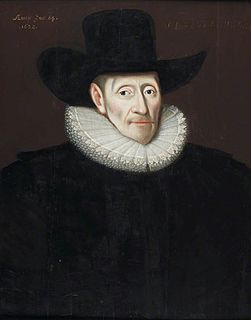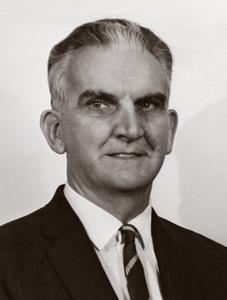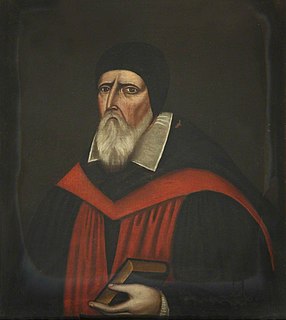Related Research Articles

Jesus College is one of the constituent colleges of the University of Oxford in England. It is in the centre of the city, on a site between Turl Street, Ship Street, Cornmarket Street and Market Street. The college was founded by Elizabeth I on 27 June 1571 for the education of clergy, though students now study a broad range of secular subjects. A major driving force behind the establishment of the college was Hugh Price, a churchman from Brecon in Wales. The oldest buildings, in the first quadrangle, date from the 16th and early 17th centuries; a second quadrangle was added between about 1640 and about 1713, and a third quadrangle was built in about 1906. Further accommodation was built on the main site to mark the 400th anniversary of the college, in 1971, and student flats have been constructed at sites in north and east Oxford.

Sir Henry Savile was an English scholar and mathematician, Warden of Merton College, Oxford, and Provost of Eton. He endowed the Savilian chairs of Astronomy and of Geometry at Oxford University, and was one of the scholars who translated the New Testament from Greek into English. He was a Member of the Parliament of England for Bossiney in Cornwall in 1589, and Dunwich in Suffolk in 1593.

Dr John Davies, Mallwyd was one of Wales's leading scholars of the late Renaissance. He wrote a Welsh grammar and dictionary. He was also a translator and editor and an ordained minister of the Church of England.

Sir Eubule Thelwall was a Welsh lawyer, academic and politician who sat in the House of Commons between 1624 and 1629. He was principal of Jesus College, Oxford from 1621 to 1630.

Kenneth Ewart Boulding was an English-born American economist, educator, peace activist, and interdisciplinary philosopher. He published over 36 books and over 112 articles. Boulding was the author of two citation classics: The Image: Knowledge in Life and Society (1956) and Conflict and Defense: A General Theory (1962). He was co-founder of general systems theory and founder of numerous ongoing intellectual projects in economics and social science. He was married to sociologist Elise M. Boulding.
John Norman Leonard Baker was a geographer associated with Jesus College, Oxford for nearly sixty years.

Francis Mansell was Principal of Jesus College, Oxford on three occasions: from 1620 to 1621; from 1630 to 1648, when he was ejected by the Parliamentary visitation of the University of Oxford; and from 1660 to 1661. Mansell remained an inhabitant of the college until his death on 1 May 1665. He had previously studied there and left all his property to the college.

Hugo Daniel Harper was Principal of Jesus College, Oxford, from 1877 to 1895.
Thomas Dove was Bishop of Peterborough from 1601 to 1630.
John Cotterell DCL was an English clergyman and academic at the University of Oxford, who was one of the founding fellows of Jesus College, Oxford.
John Vaughan, 1st Earl of Carbery was a Welsh courtier and politician who sat in the House of Commons in 1601 and from 1621 to 1622. He served Robert Devereux, 2nd Earl of Essex, and later Prince Charles, heir to the throne of King James I. However, his career ended when the Prince acceded to the throne in 1625, and he later estimated that serving the Prince had cost him £20,000, which went unrecompensed.
Thedore Price was a Welsh Anglican clergyman and academic. He served as Principal of Hart Hall, Oxford for 18 years and was also a prebend of Westminster Abbey. However, after falling out with his patron, John Williams, he sided with William Laud and was reputed to have converted from Anglicanism to Roman Catholicism at the end of his life.
Thomas Prichard was a Welsh clergyman and academic at the University of Oxford.
Francis Davies was a Welsh clergyman who was Bishop of Llandaff from 1667 until his death.
George Stradling was Dean of Chichester Cathedral from 1672 until his death.

The main buildings of Jesus College, one of the colleges of the University of Oxford, are located in the centre of the city of Oxford, England, between Turl Street, Ship Street, Cornmarket Street, and Market Street. Jesus College was founded in 1571 by Elizabeth I caused by the petition of a Welsh clergyman, Hugh Price, who was treasurer of St David's Cathedral. Her foundation charter gave to the college the land and buildings of White Hall, a university hall that had experienced a decline in student numbers. Price added new buildings to those of White Hall, and construction work continued after his death in 1574. The first of the college's quadrangles, which includes the hall, chapel, and principal's lodgings was completed between 1621 and 1630. Construction of the second quadrangle began in the 1630s, but was interrupted by the English Civil War and was not completed until about 1712. Further buildings were erected in a third quadrangle during the 20th century, including science laboratories, a library for undergraduates, and additional accommodation for students and fellows. In addition to the main site, the college owns flats in east and north Oxford, and a sports ground.
Thomas Marshall was an English churchman and linguist, Rector of Lincoln College, Oxford and Dean of Gloucester.
Edward Catcher, was an English Jesuit, from London.
Dame Hilary Boulding, is a British academic administrator and former media professional. Since 2017, she has been the President of Trinity College, University of Oxford. She formerly worked for the BBC and served as Principal of the Royal Welsh College of Music and Drama.
References
- 1 2 Foster, Joseph (1891–1892). Alumni Oxonienses: The Members of the University of Oxford, 1500–1714. ISBN 978-1-85506-843-8.
- 1 2 Allen, Brigid (1998). "The Early History of Jesus College, Oxford 1571–1603" (PDF). Oxoniensia. LXIII: 117. Retrieved 16 August 2010.